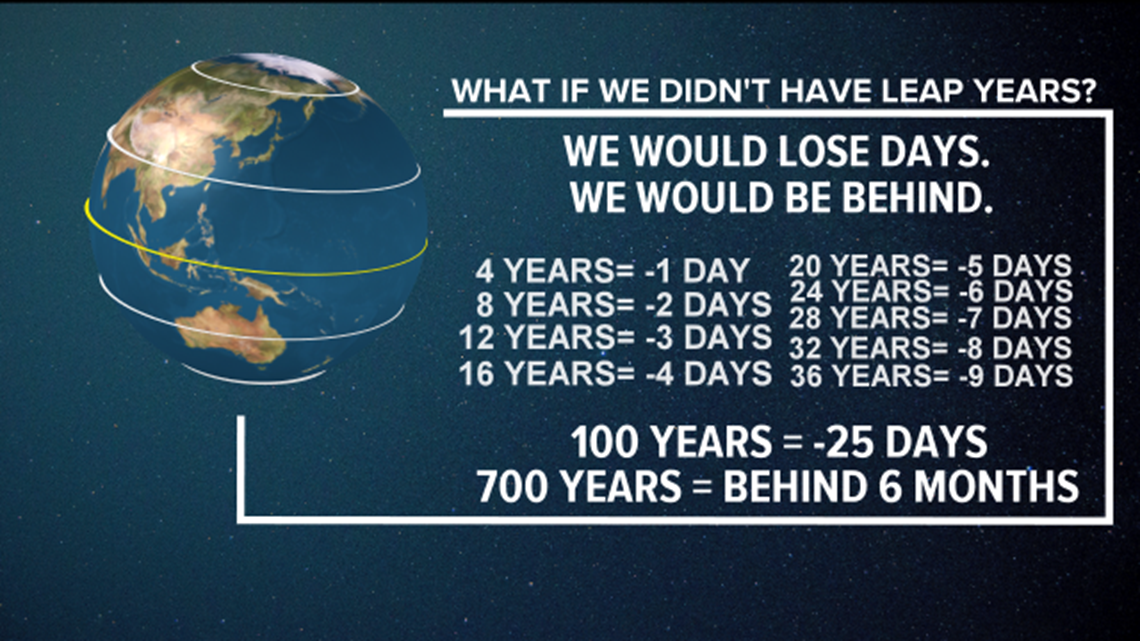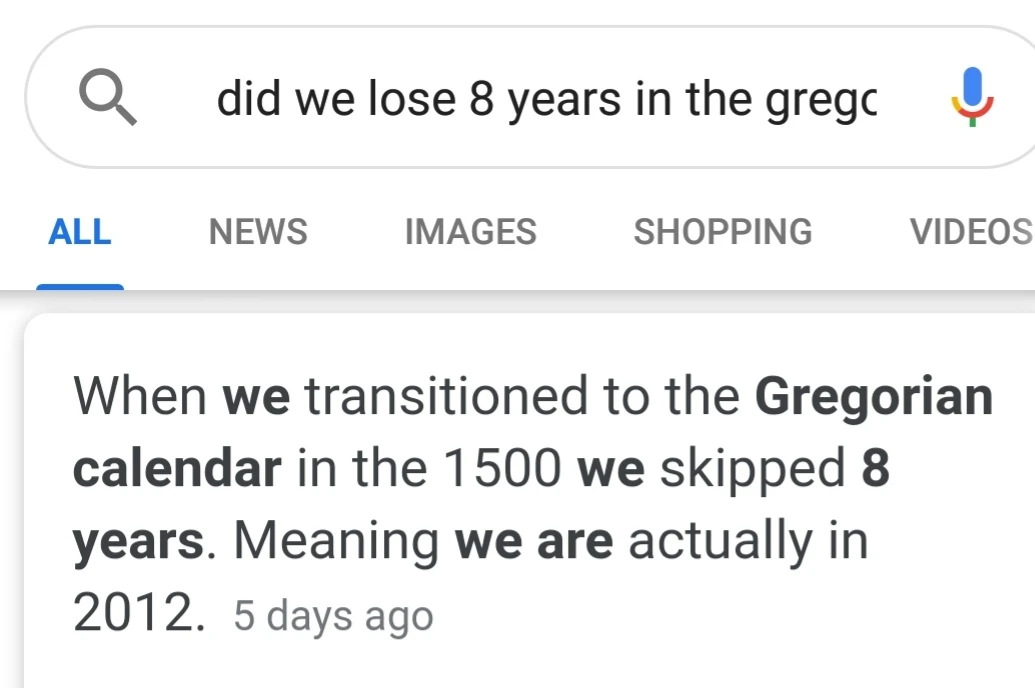did we lose 8 years
 Fact check: Did we lose eight years while transitioning to the Gregorian calendar?
Fact check: Did we lose eight years while transitioning to the Gregorian calendar?Server Error Please try later. 18 Gregorian calendar data you need to knowThursday, January 2, 2020 Whether you're using a , it's going to be the same calendar you've been in use since 1582. The same primary calendar has been used for hundreds of years and is the most widely used calendar in today's world. The Calendar is called Gregorian Calendar. Because this is the calendar we use day in and out — we feel we would be discarded if you did not know the following 18 facts of the Gregorian calendar.1. There are 12 irregular months. is a solar calendar based on a typical year of 365 days, with each year divided into 12 months. However, these months are irregular lengths. This is because 11 of them contain 30 or 31 days, with the exception of February. The second month of the year is 28 days during the common year. But, every four years, there's a year of leap that gives February an extra or intercalary day. In addition, the days of the year in the Gregorian calendar are divided into seven days. Weeks are numbered from one to 52, with 53 occasional weeks. In most of the world, it is the standard to start every week on Monday. However, there are a couple of more powerful countries, such as the United States and Canada, which begin their weeks on Sunday.2. The original goal of the Gregorian calendar was to change the Easter date. Pope Gregory XIII presented the Gregorian calendar in 1582. Before this, Europe used the Julian Calendar. The Julian Calendar was a complicated lunar calendar that was put into effect by Julius Caesar in 46 BC. However, the system was defective. The length of the solar year was miscalculated in 11 minutes. Over the years, the Julian calendar was not synchronized with the stations, which became noticeable in the 1570s producing a calendar that was shut down for ten days. This was supposed to mean Gregory, but why? As Jennie Cohen explains, "signifies that Easter, traditionally observed on March 21, fell further from the spring equinox with each passing year. "3. Pope Gregory did not design the Gregorian calendar. Although Pope Gregory authorized this new calendar, and is appointed by him, he did not come with him on his own. As noted in an article, "names a commission, led by the doctor Aloysius Lilius and the astronomer Christopher Clavius, to solve the problem." After five years, he fixed the problem. "First, let us remove those extra ten days and return on time. Well, those ten days are gone. Then we will adjust the system of years of jumping. We will have years of leap every four years, except in centenary years that are not divisible by 400." That explains why there was a year of leap in 2000, but not in 1900, 1800, or 1700. And, it also searches that the wrong conception that the biased year takes place every four years. In addition, "This changed the average year to 365.2425 days. Although not timely, it is close enough and more accurate than the Julian calendar.4. The first Gregorian calendar printed. Gregory instituted the calendar on February 24, 1582. Just over a month later, on April 3, to be exact and exclusive rights to publish a book explaining the new calendar was granted to Antoni Lilio. Lunarium Novo secondo la nuova riforma became one of the first in 1582. Vincenzo Accolti in Rome printed it. Unfortunately, Lilio could not continue with the demand for printing calendars. Consequently, their exclusive rights to the calendar were revoked on 20 September 1582. The Pope then .5. After replacing the Julian calendar, the Gregorian calendar faced resistance. Because Gregorio was the Pope and everything, there was no problem for Roman Catholic countries such as Italy, France, Spain and Portugal to adopt the new calendar. But that was not the case with European Protestants. The Catholic Cruch had no power over these states. Therefore, they could not be forced to change calendars. The Protestants suspected the new calendar and considered it "a suspicious Catholic intrusion". Some believed it was the work of Antichrist. Because of this, the Gregorian calendar was not embraced by these countries until much later. For example, it was not adopted in Germany until 1700 and England in 1752.6. The Gregorian calendar differs from the solar year in 26 seconds a year. "Even though Lilius is ingenious method of synchronizing the calendar with the seasons, his system is still running 26 seconds," Cohen explains. What is going on for twenty-six seconds means that since its implementation, "a discrepancy of several hours has arisen." It is said that for "the year 4909, the Gregorian calendar will be a full day ahead of the solar year. "7. The days of the leap can be traced back to ancient times. While the Gregorian Calendar is known for its years of leap, this idea had been developed by ancient civilizations. The ancient Egyptians are credited for determining the length of a solar year. They even went ahead and adopted a calendar that included an extra day every four years. It is believed that the Europeans were introduced to this idea after Cleopatra shared this system with Julius Cesar.8. The Gregorian calendar is useless — well, at least for astronomers. Sounds a little hard. But there's a scientific reason behind the statement, and I'm not biased against the Gregorian calendar. As the , "the Gregorian Calendar is useless for astronomy because it has a ten-day hiatus in it. To calculate backward positions in time, astronomers use the Juliana date. "9. January 1 and the beginning of a new year. Believe it or not, January 1 has often been considered the beginning of the new year. When Caesar presented his calendar in 45 BC, he made the beginning of the year on January 1. Noted by , January 1 "was always the date on which the solar number and the gold number were increased. "However, the church did not like the wild parties that took place at the beginning of the New Year, and in C.E. 567, the Council of Tours declared that having the year of beginning on January 1 was an old mistake that must be abolished." The abolished observance did not last. But this is where things get confused. Some argue that Pope Gregory re-established on January 1 as the beginning of the new year, instead of March 25. Others think it's a myth. According to WebExhibits, this erroneous idea "because in 1752 England moved the beginning of the year to 1 January and also changed the Gregorian calendar. But in most countries, the two events were not related." Scotland is an example of this. Although Scotland changed the Gregorian calendar with England in 1752, the beginning of the new one had been January 1st since 1600. 10. Double date. A double date is not to schedule an appointment with you and your significant partner. The double date has to do with the transition from Julian to the Gregorian calendar. The change of the Julian Calendar t the Gregorian Calendar is commonly known as a dual quote to prevent any confusion. Regardless of the name, from 1582 to around 1923, there were two calendars in use. Both Julian and Gregorian calendars were used. Not all countries had moved to the Gregorian calendar, and because of this problem, it was necessary to indicate the date for both calendars. For example, "10/21 February 1750/51". As Matt Rosenberg explained in "the dates were written with O.S. (Old Style) or N.S. (N.S.) after the day, so people who examine the records could understand if they were looking at a Julian date or a Gregorian quote." A famous example of this is George Washington. He was born on February 11, 1731 (O.S.), but "his birthday became on February 22, 1732 (N.S.) under the Gregorian calendar. "The change in the year of his birth was due to the change in when the change of the new year was recognized," adds Rosenberg. "Remember that before the Gregorian calendar, March 25 was the new year, but once the new calendar was implemented, it became January 1. Washington was born between January 1 and March 25, so the year of his birth became a year later in the change to the Gregorian calendar. The days have been "lost" forever. When Pope Gregory issued "Inter Gravuissimus", in February 1582, that meant that ten days would have to be eliminated from the calendar. Remember, because the Julian calendar was not accurate, it had fallen behind the centuries. When the new calendar was official on October 4, 1582, people woke up the day following a new date; October 15th. Luckily, the day of the week did not change because it was a Friday. 1582 is not the only time in history that the days faded from a calendar. When England changed to the Gregorian Calendar on September 2, 1752, they woke up on September 14. And, because we were still a colony, this meant that the occasion also happened in the United States. There are also more recent examples. In Alaska, October 6, 1867, he was followed by October 18, 1867. The reason was that to this point, Alaska was part of Russia, a country that did not use the Gregorian Calendar. Russia changed in 1918 and Greece in 1923. Because these countries waited so long, they had to jump more than 13 days. 12. There was once on February 30th. When Sweden changed the Julian calendar for the Gregorian they did not sacrifice days like other countries. Instead, they set a calendar. The plan was to omit jump days in the next 40 years to eliminate those extra ten days. The plan didn't work well, and in 1712, the Great North War broke out. The war is so brutal that no one remembered taking the next two days. The powers that were, at that time, returned to the Julian calendar in 1712. Finally, we jumped to the Gregorian calendar in 1753 forever, and we never saw February 30 again. 13. The leap years could mean an additional salary (or a salary cut). As it is written in the , "While most of the years are 52 weeks longer a day, the years of jump are 52 weeks and two extra days." Therefore, if you are payment days drop in any of these days, then you will receive an additional payment. Before you start thinking about how you're going to spend that extra money, most companies have a vacuum. "To compensate for the additional payment day, companies will probably reduce individual salads payment checks all year round to "pay" for extra payment," says the . "Most salted individuals promise an annual salary, not a specific amount each paycheck."14. Days of the week. Did you ever wonder why there are seven days a week? The Gregorian calendar followed the front of ancient Babylon. Since 600 BCE, the seven-day week was based on the phases of the moon. The last day was set aside as a holy day for the new lunar phase. Eventually, the days of the week were appointed by Greek gods; Ares, Hermes, Zeus, Aphrodite and Cronus. The Romans replaced these names with their equivalents; Dies Solis, Dies Lunae, Mars, Mercury, Jupiter, Venus and Saturn. However, they really come from German and Nordic gods. For example, Tuesday (Tiw), Wednesday (Woden), Thursday (Thor), and Friday (Freia).15. Origin of the names of the months. The Gregorian calendar continued to use the months found in the Julian calendar, which were appointed mainly by Roman gods. But also historical figures and Latin terms. 16. Other calendars are more precise. Despite its popularity and use, it states that the Gregorian calendar is not the most accurate. For example, "The Persian calendar, the official calendar of Iran and Afghanistan, requires less adjustments (such as years of jumping)." Some even claim the Gregorian calendar. 17. Late approvers. Most countries adopted the Gregorian calendar hundreds of years ago. But there were a few smugglers. Slower to accept change were China (1912), Bulguria (1916), Russia (1917), Greece (1923), and Turkey (1926). More recently, Saudi Arabia replaced the moon-based Hijri calendar with the Gregorian in 2016. Although the country was 434 years late, they always say it's better late than ever. 18. The recent reforms of the Gregorian calendar have failed. As we have already said, the Gregorian is not perfect. Because of this, there have been many attempts to reform the calendar, so it is more accurate. Besides, but all this. Here are some notable examples of failed Gregorian calendar reforms: In 2011, Richard Conn Henry, an astrophysicist at Johns Hopkins University and former deputy director of NASA's astrophysical division, joined economist Steve Hanke. They created the one that would create a fixed calendar. Each calendar seems to have a problem, and the Henry/Hanks calendar meant that every year, the date falls exactly the same day. Have you thought about making a calendar? We did. We are Calendar — but we stay with making it more productive within the calendar year. Editor in Chief in Calendar. Former editor-in-chief and writer at Startup Grind. Independent editor at Entrepreneur.com. Deanna loves to help build startups, and guide them to discover the business value of their online content and social media marketing. Related stories Get the app:Pin It on Pinterest Share this post Share this post with your friends!

Fact check: Did we lose eight years while transitioning to the Gregorian calendar?

Fact check: Did we lose eight years while transitioning to the Gregorian calendar?

End of the World on Jun 21 , 2020 ? Did we lose 8 years ? - YouTube

Fact Check: Did We Lose Eight Years While Transitioning To The Gregorian Calendar?

The Mayans were right all along... : memes
Did the world lose 8 years in the 1500s while adopting the Gregorian calendar? - Quora

Fun fact! when the world made the switch to the gregorian calendar in the 1500's, we lost about 8 years in translation. so, technically, this is the year - iFunny :)
Did the world lose 8 years in the 1500s while adopting the Gregorian calendar? - Quora
/cdn.vox-cdn.com/uploads/chorus_asset/file/7212533/new-years-culture-social.0.jpg)
We've been using the Gregorian calendar for 434 years. It's still bizarre. - Vox
MXM on Twitter: "I watched a tiktok that said there was an error in a particular calander so it's actually 2012 and not 2020. Then it went onto say what if the

Switch to the Gregorian calendar in the 1500's, we lost about 8 years in translation. So, technically, this is the year 2012... - iFunny :)
Did the world lose 8 years in the 1500s while adopting the Gregorian calendar? - Quora

18 Gregorian Calendar Facts You Need to Know - Calendar

Quick Answer: Did We Really Lose 8 Years? - Ebook

The world lost 8 years in the 1500s due to calendar changes. That means this year is technically 2012 - iFunny :)

Do NOT lose hope! It took me 8 years to find my own cure... : Rosacea

The 16:8 Diet And Heavy Lifting Helped Me Lose 70 Pounds'

WEATHER BLOG: Leap year | kiiitv.com

6 Year Molars & Losing Baby Teeth: What to Expect - Nurture Life

This Is How Long It Really Takes To Lose Weight | HuffPost Australia Food & Drink

How to lose 8 years of age on your driver's license lol : transpositive

When Do Baby Teeth Fall Out? Age, Order, Complications, More

How Long Does It Take to Lose Weight?

It Took Me 8 Years To Write These 18 Quotes As I Finally Started To Understand Life! | Bored Panda

8 week weight-loss plan saw a London woman lose a stone | Daily Mail Online

How to Lose 10 Pounds in a Month: 14 Simple Steps

Calorie Counting And Shaun T Workouts Helped Me Lose 170 Lbs.

89 Pounds Lost: 8 YEARS TO LOSE 89 POUNDS BECAUSE I WOULD NOT GIVE UP ON GETTING MY HAPPINESS BACK! - The Weigh We Were

Is Losing 100 Lbs. in a Year Healthy and Realistic? – Fat, Broke and Stupid

Client Success Stories and Transformations — Thrive Health & Wellness
After 8 years of weight loss, I finally reached my ideal figure. If you really want to lose weight, you must understand these 10 truths. | DayDayNews

SWMemes Wiki Off-Topic Post #3 | Fandom
The American people are on course to lose $1 trillion over the next 8 years" | Stop Predatory Gambling

Child Weight Loss Success Story: Kacie, 7 years old, drops a significant 8 BMI points and helps her parents lose pounds, too!** - Kurbo

Pin on Before and After Weight Loss Stories

Pin on Workouts & Nutrition For Fat Loss

Safedome | Ultra Slim Rechargeable Bluetooth Tracker, Locator Finder Card - With a Lifespan of Over 8

8 Reasons for Unexplained Weight Loss - Why Am I Losing Weight?

How to Lose 10 Pounds in Just 1 Week
Posting Komentar untuk "did we lose 8 years"